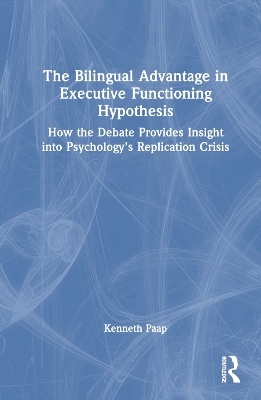
The Bilingual Advantage in Executive Functioning Hypothesis
Routledge (Verlag)
978-1-032-31100-5 (ISBN)
The Bilingual Advantage in Executive Functioning Hypothesis is a ground-breaking book that explores one of the liveliest debates in bilingualism and cognitive psychology. It examines the hypothesis that using two languages leads to the enhancement of domain-general executive functioning (EF) and argues that either the bilingual advantage does not exist or is restricted to very specific circumstances. The conclusion extends to situations where EF is referred to as self-control, self-regulation, self-discipline, attention-control, impulse control, inhibitory control, cognitive control, and willpower.
The book explores the evolving core assumptions underlying the bilingual advantage hypothesis, framing the debate within the broader context of a replication crisis. It provides a critical review of seminal studies and meta-analyses and argues that the empirical evidence does not support a bilingual advantage on EF that is distinguishable from zero. Part I lays the foundation for the debate, providing the background needed to understand the state-of-the-art research on EF and bilingual language control. The next part then provides a detailed review of the empirical evidence triggering each iteration of the hypothesis. This includes new data that compares tests of the bilingual advantage hypothesis based on self-reports of cognitive control to performance-based measures of EF. A third theoretical part considers several explanations for why managing two languages may not enhance aspects of domain-general cognition.
This is essential reading for students and scholars in bilingualism, psychology, linguistics, languages, speech and hearing science, and related fields. It also serves as an excellent primary source for graduate courses on the bilingual advantage debate, and is useful for advanced undergraduate courses in psycholinguistics, cognition or bilingualism.
Kenneth Paap is Professor of Psychology who currently directs the Language, Attention and Cognitive Engineering lab at San Francisco State University, USA. He has previously served for 30 years as a Professor, Department Head, and Dean at New Mexico State University.
Part I. The Foundation
1. Early Research on the Effects of Bilingualism on Intelligence and Executive Functioning
2. Executive Functioning in the Lab and in Everyday Life
3. Factors that Affect EF and Often Confound Tests of the Bilingual-Advantage in EF Hypothesis
4. What We Think We Know About Bilingual Language Control
Part 2. The Debate Emerges
5. What did Simon Say? A Spark Ignites a Fire
6. The Bilingual Advantage as Enhanced Inhibitory Control
7. Shifting to a Monitoring Account
8. Shifting to an Executive Attention Account
9. Accounts that Emphasize "Adaptations"
10. The Special Role of Language Switching
11. The March of the Mighty Meta-Analyses
12. Problematic Meta-Analyses and Confirmation Bias
13. Mega-Data & Mega-Control: A Small Chapter on Big Data and Extreme Bilinguals
14. The Effects of Bilingualism Over Time and on Aging
15. Are there Bilingual Advantages in Self-Reports of Cognitive Control or Impulsivity?
Part 3. Reconstruction
16. What May Cause the Steady Drip of Positive Findings?
17. In Defense of the Hypothesis: And a Rebuttal
18. The Bialystok & Craik (2022) "New and Improved" Attentional Control Theory
19. Why Cognitive Neuroscience Can’t Resolve the Debate
20. Is there an advantage? How should we decide? Why might there be no advantage?
Name index
Subject inde
| Erscheinungsdatum | 29.12.2022 |
|---|---|
| Zusatzinfo | 15 Tables, black and white; 22 Line drawings, black and white; 1 Halftones, black and white; 23 Illustrations, black and white |
| Verlagsort | London |
| Sprache | englisch |
| Maße | 156 x 234 mm |
| Gewicht | 540 g |
| Themenwelt | Geisteswissenschaften ► Psychologie ► Allgemeine Psychologie |
| Geisteswissenschaften ► Psychologie ► Pädagogische Psychologie | |
| Geisteswissenschaften ► Psychologie ► Verhaltenstherapie | |
| ISBN-10 | 1-032-31100-2 / 1032311002 |
| ISBN-13 | 978-1-032-31100-5 / 9781032311005 |
| Zustand | Neuware |
| Informationen gemäß Produktsicherheitsverordnung (GPSR) | |
| Haben Sie eine Frage zum Produkt? |
aus dem Bereich


